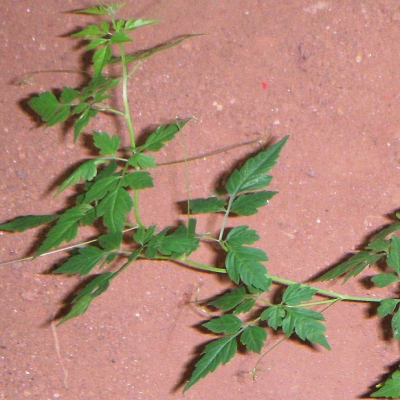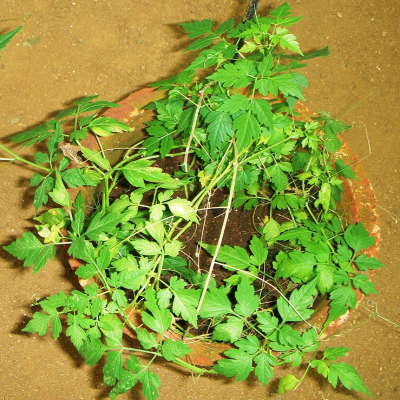Cardiospermum halicacabum L.
Family : Sapindaceae
Group : 2. Dasapushpam, Anti-arthritic/anti-rheumatic/anti-inflammatory
Parts Used : Root , Leaf , Seed
Vernacular Names :-
| English | : | Balloon vine, Heart’s Pea |
| Malayalam | : | Valli Uzhinja , Uzhinja |
| Hindi | : | Kapalphoti |
| Sanskrit | : | Indravalli |
| Bengali | : | Lataphatkari |
Distribution and Habitat: It is distributed throughout India.
Botany: A pubescent or nearly glabrous annual or perennial with slender branches climbing by means of tendrillar hooks.
- Leaf: Ternately bicompound, leaflets acuminate at the apex.
- Flower: Small, white coloured.
- Fruit: Brown, membraneous, depressed, pyriform 3-lobed capsule up to 3 cm across, winged at the angles.
- Seed: Black with large white heart shaped aril. 4-5 mm in diameter.
analgesic, diuretic, laxative, stomachic and anti-inflammatory properties. It is used in the treatment of indigestion, constipation, arthritis, ear infections and inflammatory conditions.
Properties: The plant is antirheumatic and antidote for snakebite. Root is diaphoretic, diuretic, aperient, laxative, rubefacient and emmenagogue. The plant is found to exhibit significant diuretic and anti-inflammatory activity. The plant also shows sedative effect on central nervous system, significant analgesic, vasodepressant and anti-spasmodic effects. The alkaloid fraction from seeds showed antibacterial and hypotensive activities and cardiac inhibition in anaesthetized dogs, blocked spasmogenic effects of acetylcholine histamine and 5-HT on guinea pig ileum, biphasic effect on frog Rectus abdominis muscle.
Chemical constituents: Plant yields saponin. Seeds contain cyanogenic glyceride.
Uses: The entire plant is used in medicine.
- The roots are useful in strangury, fever, arthritis, amenorrhoea, lumbago and neuropathy.
- The leaves are good for arthritis, otalgia and ophthalmodynia.
- The seeds are good for arthritis and fever.
- The plant has sedative action on the central nervous system.
- Roots and leaves are good for hair growth and are useful in rheumatism, nervous diseases, piles, chronic bronchitis, fevers, hydrocele, amenorrhoea, sprains and oedema.
- Juice of the plant is dropped into the ear in earache.
Formulations: Indravalli, Nilabringadhi tailam
Propagation: seed


